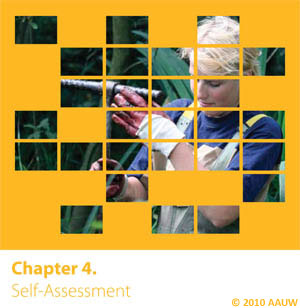


Boys Assess Their Math Skills Higher Than Girls Do
Dear friends of Women in Science,
Welcome to AAUW week, the July version. This week, I will be making posts about self-assessment, a topic described in depth in chapter 4 of AAUW's 2010 report, Why So Few? Women in Science, Technology, Engineering, and Mathematics.
Research by sociologist Shelley Correll helps explain how girls' and women's seemingly voluntary decisions to avoid science, technology, engineering, and mathematics (STEM) careers are influenced by the cultural belief that science and math are male domains. She found that, among students with equivalent past achievement in math, boys assessed their mathematical ability higher than girls did.
Looking at the National Educational Longitudinal Study of 1988, a national data set of more than 16,000 high school students, Correll identified three items as indicators of mathematical self-assessment:
"Mathematics is one of my best subjects," "I have always done well in math," and "I get good marks in math." Students were asked to agree or disagree, on a six-point scale, with these statements during their sophomore year of high school.
Student mathematical achievement was approximated through past math test scores and average math grades that students received in high school. Correll's analysis showed that high school boys were more likely than their female counterparts of equal past mathematical performance to believe that they were competent at mathematics. Interestingly, the effect was reversed when the students assessed verbal ability: Female students made significantly higher self-assessments of verbal ability, controlling for actual verbal performance.
This suggests that stereotypes about gender influence students' perceptions of their abilities in particular fields. Contrary to what some might think, boys do not assess their task competence higher than girls do in every area, just in the areas considered to be masculine domains. Correll first noticed this apparent gender difference in self-assessment when she was teaching high school chemistry.
For those of you who teach math or science, have you ever noticed that girls tend to assess their abilities lower than boys?

Hmcbride2000,
You bring up an interesting point. It's an open question why the scientific fields of biology and chemistry have attracted more women than the fields of engineering or computer science or physics. They're all scientific, but the latter group at least has the reputation of being more math-intensive although that's certainly not always true. I wonder if gender differences in how people assess their math skills has something to do with more women choosing biology and chemistry.
I've observed this even at the graduate level. Women who were strong in math and science still self-rated themselves as having lower ability, even when they had aced the men in their qualifying exams. The few who didn't were in math dominated fields like physics and engineering. Those who rated themselves lower (myself included) relegated themselves to Biology or Chemistry.
I do think encouragement from a teacher - man or woman - can make all the difference.
Hi Christi,
I partly started to self-identify as a scientist in junior high school. My pre-Algebra teacher supported my interest in hard word problems (he was a man) while my science teacher (who was a woman) selected only boys for a science field trip and when my parents asked her at PTA, she said she thought I was not interested although I had only A's. So that made me angry enough to speak up more in science. These are ancient threads leading to where I am, but I think they were somewhat important. This is an issue that matters personally to me, as well as globally.
cheers,
Laura
















